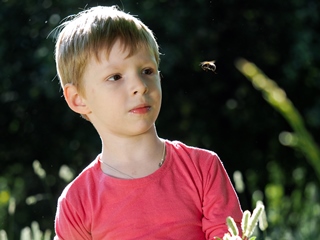What to do when you're around bees
Bee stings

Here are some things you can bear in mind when you encounter bees:
- Sugary foods and drinks will attract bees and wasps so be careful what you eat outdoors.
- Stings inside the mouth may be very dangerous, so look inside the cold drinks before you take a sip, alternatively keep your beverage in a bottle with a cap.
- Rinse your garbage and recycling bins and keep lids on them.
- Don't walk barefoot outdoors and don’t wear loose-fitting clothes.
- If a bee is flying around your head - keep still and don’t swat at it.
The majority of stings cause only minor problems, but severe symptoms like allergic reactions may occur. If you know you’re allergic or you’re not sure, don’t spend too much time in gardens full of flowers.
If you get stung by a bee:
- Remove the stinger as soon as possible by scratching it off the skin, don’t squeeze it
- Look for symptoms of an allergic reaction (swelling, itchiness, difficulty in swallowing and breathing).
If these symptoms are present, immediately go to a healthcare facility. You can take an antihistamine and if prescribed in the past use epinephrine (Epipen).
If you don’t have any allergic symptoms you can simply wash the area with soap and water and apply ice to the sting for 20 minutes.
You can take ibuprofen or paracetamol to ease the pain and apply a calamine lotion or hydrocortisone cream to the sting site.
Contents:
The content on this page was last updated on 26 January 2023


